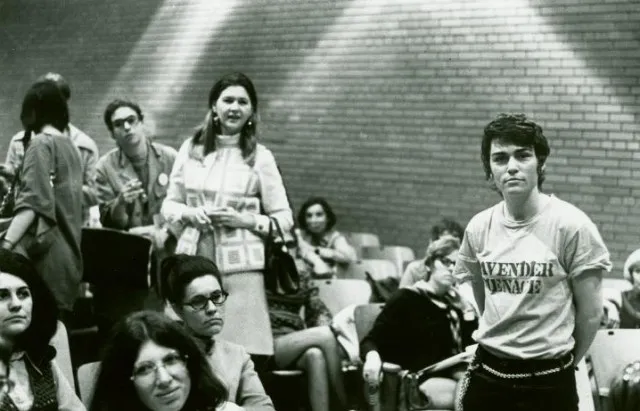
During a 1969 meeting of the National Organization for Women (NOW), Betty Friedan used the term “Lavender Menace” to describe a seemingly small but outspoken sect of the women’s liberation movement demanding equal treatment for lesbians. Friedan was opposed to this questioning of heteronormativity because she and other prominent leaders of the women’s liberation movement believed it would be harmful to their group as a whole. These women believed that lesbian issues were unrelated to the feminist movement as a whole and that by putting them into the mainstream feminist agenda, they would invalidate the entire movement.
This rejection of lesbian women caused many to feel excluded from NOW and other women’s organizations. Although many women criticized Friedan for her statements, lesbians remained on the fringes of the feminist movement for several years.
In 1970, Lavender Menace was officially established as a feminist group specifically for lesbians who were left out of mainstream feminism. Their most famous demonstration was during the Second Congress to Unite Women when lesbian issues had been entirely ignored throughout the conference. During the protest, the activists cut the lights and when the lights came back, they had surrounded the room and revealed shirts with the name “Lavender Menace.” This protest made an incredibly strong statement to hundreds of women attending the conference and forced them to confront the growing sect of women they had ignored and dismissed.
After this protest, NOW officially included lesbians’ rights in their key issues. Friedan later apologized and supported anti-discrimination laws throughout the country. By demonstrating and demanding the attention they rightly deserved, Lavender Menace achieved their goal: to be recognized and supported by their fellow women.
The reason this information is imperative in today’s society is obvious. In order to move forward with social change and reform, we must know where our roots lie. We must recognize the thousands of women who fought for our rights and made what were once radical notions a part of everyday life. In a day when LGBT+ people, and lesbians especially, are still discriminated against, it is necessary for us to recognize the long and tumultuous relationship between feminism and lesbians. As a young woman and a member of the LGBT+ community, I find it incredibly powerful to learn about the women who came before me and were, more often than not, forgotten by history.
In order to reach the future we so desperately want, we must recognize the past actions that brought us to this point. Educate yourself and others. Protest. Speak out. A small group of people can make a big change.



Comments are closed.